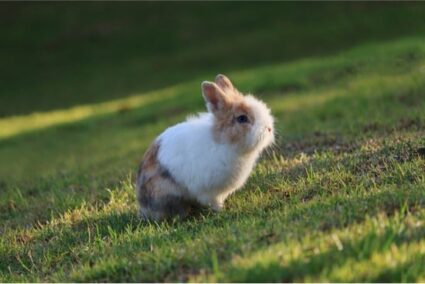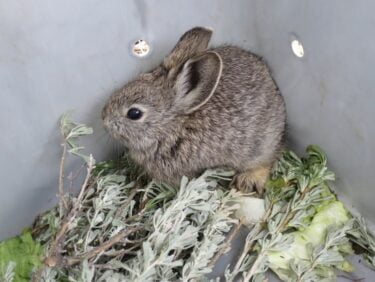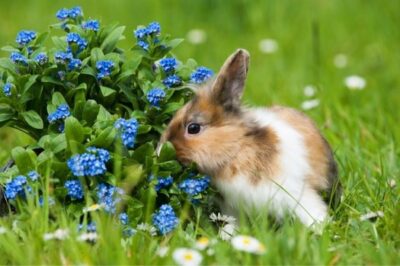While baby rabbits start off tiny, they quickly grow into adult rabbits. Finding rabbit breeds that remain small before you introduce them to your home as pets can prevent problems later on.
Some breeds never exceed 6 lbs. in weight. Examples include the Mini Lop Plush, Netherland Dwarf, Columbia Basin Pygmy, Lionhead and Jersey Wooly. Any dwarf rabbit breed is guaranteed to remain minuscule throughout its lifespan.
A small rabbit is no different from a larger one, but some small and dwarf breeds need special care. If you bring one into your home, you’ll need to understand their specific requirements.
What Is The Average Size And Weight of a Rabbit?
Rabbits come in a variety of different shapes and sizes. Rabbit size is usually defined by the bunny’s weight. Rabbits are divided into four weight classes:
- Small rabbits weight under 6 lbs.
- Medium rabbits weight between 6 and 9 lbs.
- Large rabbits weight between 9 and 11 lbs.
- Giant rabbits weight over 11 lbs.
The American Rabbit Breeders Association, using a breed’s ideal adult weight, defines these weight classes. Dwarf rabbits are not recognized as a separate weight class.
If you’re looking for a rabbit that stays small, remember something important. All bunnies look tiny when they’re young. Rabbits experience rapid growth spurts. Don’t adopt a medium rabbit when you expected something smaller.
How Quickly Do Rabbits Grow to Full Size?
Just like humans, rabbits grow at their own pace. Some rabbits shoot up in size early, which others are late bloomers. Their breed will also play a part in this.
Most small breeds of rabbit will be fully grown by the age of six months. If you adopt a large or giant breed, it could take a year.
Always assume that your rabbit could grow bigger until they’re 18 months old. This is unlikely in the event of small breeds. It can happen though, so be prepared.
Difference Between a Small Rabbit and a Dwarf Rabbit
A dominant gene causes dwarfism in rabbits. If one of a rabbit’s parents carries this gene, a dwarf rabbit could be born. There are two types of dwarf rabbit:
- True Dwarves are born with one set of dwarf genes, and one set of ‘normal’ genes. These bunnies have several key characteristics.
- False Dwarves are born with two sets of ‘normal’ genes, despite having a dwarf parent. These bunnies will be larger than dwarves, but smaller than a conventional rabbit.
Dwarf rabbits are typically identifiable by the following characteristics:
- They weigh less than 4 lbs. A dwarf rabbit can weigh as little as 1.5 lbs.
- They have larger, rounder heads than traditional rabbits. They are also large, round eyes.
- They have shorter ears, that invariably point straight upward. Floppy ears are almost unheard of in dwarf rabbits.
Be careful if you decide to get a dwarf breed. Do your homework, and ensure that the breeder is reputable. Some dwarf breeds carry illnesses, which an unscrupulous breeder will not disclose.

Which Rabbit Breeds Carry the Dwarf Gene?
Not all breeds of bunny are capable of producing dwarf rabbits. Only eight breeds are confirmed as containing the dwarf gene:
- American Fuzzy Lop
- Dwarf Hotot
- Holland Lop
- Jersey Wooly
- Lionhead
- Mini Rex
- Mini Satin
- Netherland Dwarf
A rabbit carrying the dwarf gene will often live a healthy, happy life. Some dwarf bunnies need extra care, though.
Can Two Dwarf Rabbits Breed?
It is critical that two dwarf rabbits do not breed. As the dwarf gene is dominant, it will manifest twice in the young rabbit. This is lethal.
Baby rabbits born to two dwarf parents are referred to as ‘peanuts.’ They are tiny when born, rarely larger than a human fingernail. Sadly, they do not get the opportunity to get any bigger.
The majority of ‘peanuts’ are stillborn. If the rabbit survives the birth, they typically live two weeks at most. In extremely rare cases, they make survive up to four weeks.
Nobody can say for sure why the dwarf gene is fatal. Some experts theorize that peanuts have a brain large enough to sustain life. Others think that it has to do with digestive issues.
Breeds of Rabbit That Stay Small
Among the smallest rabbit breeds commonly kept as pets are:
- Netherland Dwarf Rabbit Breeds. This is by far the most popular dwarf bunny. These pint-sized cuties are adorable, but spirited. They’ll bite if they don’t want to be held.
- Mini Plush Lop Rabbits. These bunnies are a cross between a Mini Rex and a Holland Lop. Both of these breeds are loving, making this arguably the most affectionate bunny around. They can weigh as little as 2.5 lbs.
- Columbia Basin Pygmy Rabbit Breeds. These are the smallest bunnies in the world, weighing just 1 lb. when grown. They’re also among of the rarest, so expect to pay top dollar.
- Lionhead Rabbits. Lionheads are named after the mane of fur around their neck. They’re affectionate once you gain their trust. You’ll need to work for that, though. They weight just 3 lbs., and are nervous as a result.
- English Angora Rabbit Breeds. The English Angora is a tiny ball of fur. You’d be forgiven for mistaking this breed for a ball of cotton wool. Despite this, they have complex grooming and dietary needs.
- Britannia Petite Rabbit Breeds. This breed weighs in at just 2 lbs., and it resembles a tiny hare. It’s not ideal for first-time rabbit owners, though. The Britannia Petite is a little nippier than most breeds.
- Jersey Wooly Rabbit Breeds. These adorable pets tip the scales at 3.5 lbs. maximum. They’re also robust, and very docile. They make great family pets.
You should investigate the particular needs of any rabbit breed before bringing them home. This is especially important with small bunnies, though.
Do Small Rabbits Need a Hutch?
If you keep a small rabbit, you may feel that a hutch is an unnecessary extravagance. After all, a small bunny will fit into a dog or cat carrier. This is an inappropriate home for a rabbit, for several reasons:
- Rabbits need to space to run, jump, and play. Anything else will be akin to a prison cell.
- Rabbits like to create zones in their home. They’ll eliminate in one corner, and sleep in another. A hutch provides this opportunity.
- Living outside a hutch may provide a small rabbit with escape opportunities. A small or dwarf rabbit will squeeze through deceptively small spaces. Hutch doors are secure enough to keep a bunny enclosed. There are various reasons why rabbits refuse to go into their hutch at night.
Even if your rabbit is small, pick up the largest hutch that you can accommodate. The more space they have, the happier they’ll be.
Do Small Rabbits Eat Less Food?
Small rabbits will eat less than their larger counterparts. A small rabbit will have a smaller stomach, and thus need to eat less.
Despite this, bringing a small rabbit into your home will not mean you can purchase less hay. The truth is, no rabbit will eat all the hay in their hutch. If your bunny does, you’re not providing enough.
As with any rabbit, the hay supply in your small pet’s home must be constantly refreshed. Failing to do so will leave the bunny’s health at significant risk. The hay will potentially be stained after being urinated upon. It will also turn moldy over time, which is toxic to rabbits.
In theory, you can feed a small rabbit fewer pellets than a larger equivalent. They won’t need as many calories to sustain themselves. Just like hay though, pellets go moldy.
If you’re going to offer your small rabbit pellets, buy little and often. This way, you’re less likely to throw away large quantities of uneaten food.
Can Small and Large Rabbits Live Together?
If you already have a larger rabbit, there is theoretically no problem adding a smaller companion. Small and large bunnies can bond, and live together in harmony. They all speak the same language.
As always though, ensure that the personalities of the two bunnies are compatible. If your larger rabbit is very dominant, this can be a problem.
It’s fine if the small bunny is happy to be submissive. They’ll quickly find a compatible rhythm. Some small rabbits have big ideas, though. A battle for dominance will become dangerous.
Small rabbits are delicate, and bunny fights can be surprisingly violent. A larger rabbit can harm a smaller counterpart. If you are going to combine these disparate sizes, bond them first.
Are Small Rabbits Better Pets Than Large Rabbits?
Size has no bearing on whether a pet is ‘better’ or not. Every rabbit, regardless of their size, has its own personality. Whether this is suitable for your family depends on what you want from a pet.
- Small rabbits can still live indoors or outside, depending on your set-up.
- Small rabbits still need to be fed and groomed every day.
- Small rabbits are intelligent and can be trained.
- Small rabbits still grow lonely and depressed if left alone too long. They need constant stimulation and company.
- Small rabbits may be friendly, or they may be feisty. It depends on the breed, and the individual bunny. Most smaller breeds are docile, though.
What are the Advantages of Small Rabbits Pets?
Perhaps the biggest advantage of keeping a small rabbit as a pet is that they’re adorable. It’s impossible to look at a baby bunny and not feel your heart melt. Small rabbits remain this cute throughout their life.
This isn’t reason enough to adopt a rabbit. They’re a long commitment. Smaller rabbits live longer than their large and giant counterparts. Their average lifespan is around 10 years.
The good news is that this will be 10 happy years. A smaller rabbit will be playful and energetic into their dotage. This is primarily because they are less likely to struggle with arthritis. Their small frames place less strain on their joints.
Small rabbits are also commonly regarded as being cleaner. They eat less, which means fewer poops to clear up. They will also be willing to be litter trained. As they’re smaller, this also leads to less molting in the spring.
Small rabbits also need less grooming, on the basis that there’s less of them. You’ll still need to groom them daily. It won’t take as long, though. You’ll quickly run out of fur to brush.
If you wish to expand your family, it’s easier with small pets. You can likely keep multiple rabbits in a single hutch, without upgrading. Just make sure all bunnies are happy with the arrangement.

What Are the Disadvantages of Small Rabbits as Pets?
Of course, for every pro, there is a con. Adopting small rabbits does some with things to consider. This is especially important if you have children. Here some advice on choosing child-friendly rabbits.
All rabbits are frail and delicate. They cannot be roughhoused with, in a way that a dog would tolerate. They’re also very nervous, and may jump from your arms. If a small rabbit is dropped from a height, it’s likely to be a fatal accident.
Smaller rabbits, especially dwarf breeds, can also experience more health concerns than larger bunnies. This can lead to more trips to the vet, which naturally means greater expense. Common health issues include:
- Dental Problems. Small rabbits have small skulls. This means that their teeth can grow to a disproportionate size. If a rabbit has dental pain and will not eat, they’ll need professional help.
- Stomach Upsets. As small rabbits have smaller stomachs, their digestive tracts can be sensitive. You may experience some trial and error in learning which fresh foods they can safely enjoy.
- Large Eyes. Dwarf rabbits have big, orb-like eyes. This means they’ll often get foreign objects stuck in them, causing weeping eyes. This will not cause much discomfort, but it may be a regular irritant for your bunny.
- Viral Infections. Smaller rabbits are a little less robust than their larger counterparts. A case of snuffles will be more severe in a small or dwarf bunny. They are less likely to beat the virus by themselves.
The energy levels of a small rabbit may be considered a drawback. They will be bundles of fun, and always want to run and play. The lightweight frame of small rabbits also means they can move at very high speed.
If you are prepared to accommodate these factors, small rabbits make wonderful pets. Just do not assume that a small rabbit is a lower-maintenance bunny. They require as much care as a larger animal, if not more.

